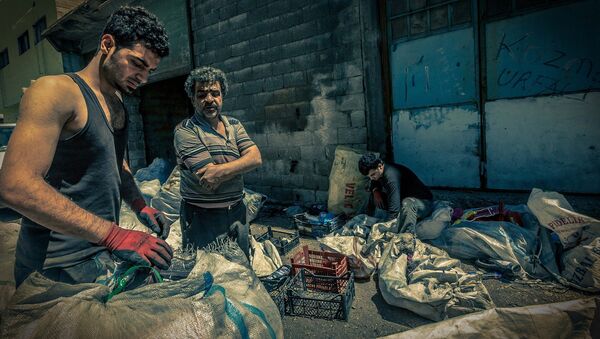Undercover TV reporters discovered slave labor in Leicester, East Midlands, where a worker called Belal admitted that he was being paid US$3.34 an hour to pack and press dresses — that's less than half of the national minimum wage in the UK.
When Belal approached his boss for a pay rise he was told that the UK factory market had to compete with China and Bangladesh, "If we pay everyone US$12 or US$7 then we will make a loss."
Indeed, it was the British government's former Chancellor George Osborne who said that the UK must compete more with countries including China, although little thought was given at the time whether that included staff wages or not.
@George_Osborne record employment in the Tory zombie economy means low wages, zero hours contracts and food banks pic.twitter.com/OXt0Ibk3La
— Jonny Heyhoe (@jonny_writer) July 27, 2016
"The clothes market is highly competitive, with brands trying to undercut each other on cost all the time, and many mainstream consumers will buy purely on price, without questioning why and how a particular garment is so cheap," Rob Harrison, director and co-founder of Ethical Consumer, told Sputnik.
"There's a lot of pricing pressure, and companies try to find a way to meet those challenges. Often, clothes are manufactured in poor countries, such as Bangladesh, where workers are paid virtually nothing per month.
"It's unusual to hear about this sort of thing happening in the UK — but then again, it's unusual to hear about clothes being made in the UK at all," he added.
Harrison told Sputnik that companies have a "legal and moral duty to ensure their employees work in safe conditions," regardless of the pressure placed on them on by the global commercial market.
#industrialstrategy — you'll be able to see the global challenges faced by UK business — and impact on workers — in tonight's @c4Dispatches https://t.co/jMxEy0Cyuj
— OlderIsWiser.com (@OlderIsWiser) January 23, 2017
'Not Good at All'
"At best, this could be a case of the companies involved not keeping on top of their supply chains. At worst, they could be consciously turning a blind eye, or sidestepping their obligations. Either way, this isn't good at all," Harrison said.
Despite the legislation, examples of modern slavery can be found in almost every corner of Britain, from brothels, nail bars, car washes and restaurants — to clothing factories.
"The UK government has made tackling modern slavery a priority, but is failing to address root causes, such as problems in supply chains," a spokesperson for Labour Behind The Label told Sputnik.
"A lot of manufacturing workshops in Leicester, a hub of the UK garment industry, pay illegally low wages, employing vulnerable people such as migrants, and so putting them in conditions akin to modern slavery."
The women who make your clothes | Labour Behind the Label #LabourRights #WorkersRights #HumanRights https://t.co/hu0af381kt
— Mikael Johansson (@HumanRights666) April 5, 2016
Labour Behind the Label added that it was "shocking" for people living in Britain to discover that workers in the UK are suffering similar violations of their human rights as those in countries like Bangladesh.
Bangladesh: Fashion or Slavery? When they will be liberated from this slavery?? pic.twitter.com/0yxS5SffSj
— Tapan Ghosh (@hstapanghosh) October 11, 2016
Fashion Square Ltd. had been contracted to make clothes for fashion brand River Island, which says it stopped using their services in February 2016 following two failed supply chain audits.
The recent #Dispatches investigation has highlighted issues with a supplier in breach of River Island’s ethical trading policy… (1/4)
— River Island (@riverisland) January 23, 2017
The recent #Dispatches investigation has highlighted issues with a supplier in breach of River Island’s ethical trading policy… (1/4)
— River Island (@riverisland) January 23, 2017
…following two failed audits and suppliers were informed not to use this factory for any of our orders… (3/4)
— River Island (@riverisland) January 23, 2017
…We are investigating this issue and will take appropriate action. #Dispatches (4/4)
— River Island (@riverisland) January 23, 2017
Fashion Square Ltd has denied it paid anyone less than minimum wage.



